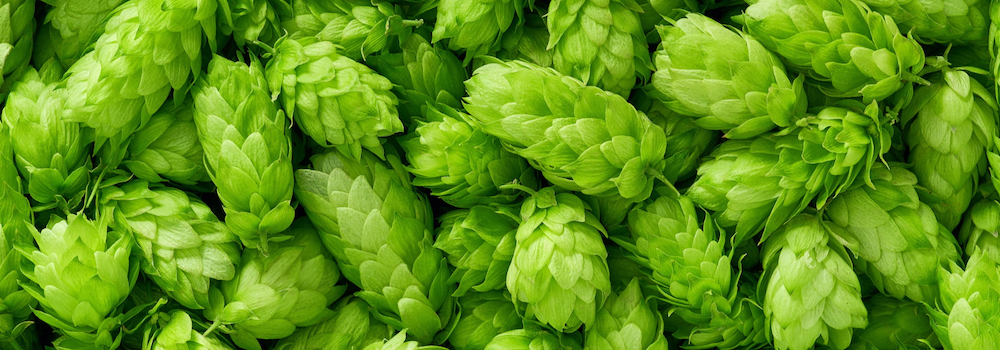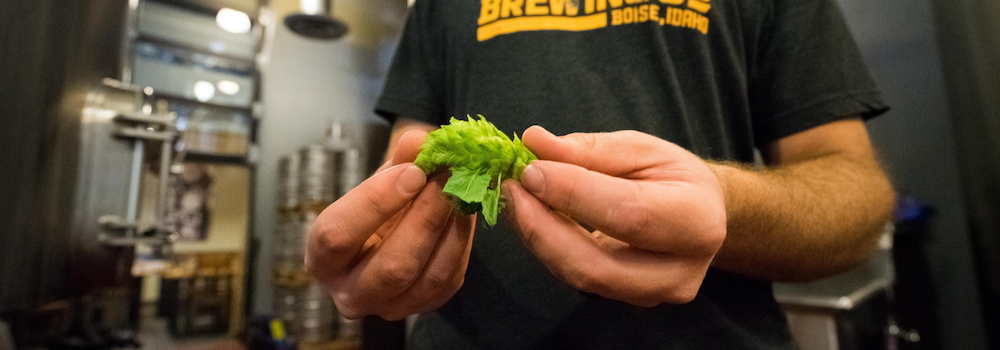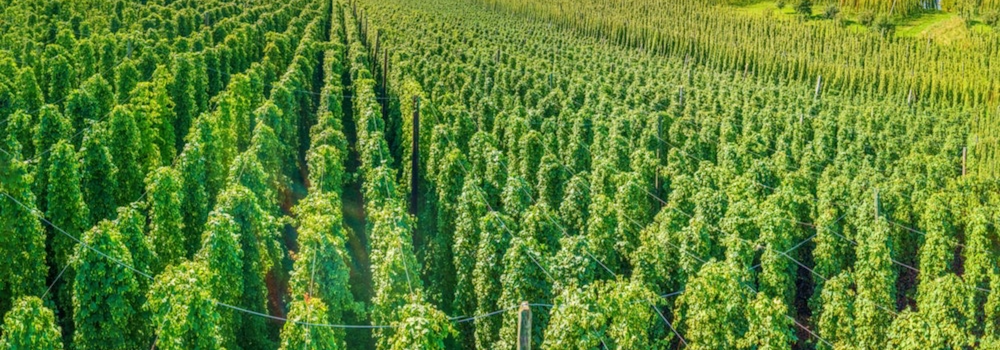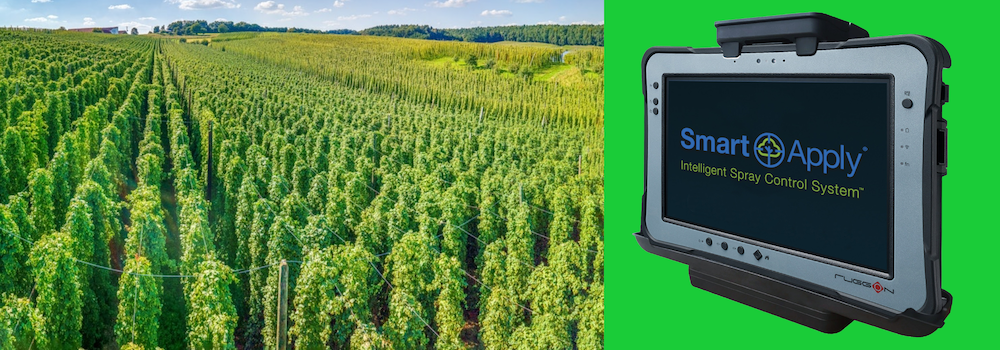In December 2022, Maggie Elliot of the Washington Hop Commission invited Smart Apply to make a presentation to member growers at the annual meeting in Yakima, Washington. She stressed that Smart Apply should explain the technology behind the Intelligent Spray Control System and how it might solve some of the significant challenges growers face. Our own Ryan Kuch was sweating bullets about speaking in front of a crowd. He shouldn’t have worried; the presentation was well received. Now Ryan is spending a lot of time in hop fields in the Yakima Valley and beyond. We recently caught up with Maggie. Here’s our conversation.
SA: Tell us about Washington Hop Commission. Are you a state agency or a trade association?
ME: We’re a little of both! The Washington Hop Commission is legally structured as a state agency, but our mission and operations are similar to a nonprofit. We serve hop growers in the State of Washington and provide administrative support for three non-profits serving the hop industry, including two national organizations. This includes Hop Growers of America, a trade association focused on grower support through technical, scientific research, trade promotion, educational outreach, and industry growth. The Commission’s programs address research and issue management on topics impacting hop growers and brewers as well as foreign market development.
SA: Why did the hop industry choose Washington State as its home base?
ME: Here’s something you may not know. Washington, Oregon and Idaho grow 98% of the U.S. hops crop. The State of Washington contributes about 75% of this crop. The growing conditions in the Pacific Northwest are perfect for hops. The plants need soil that’s rich in organic matter, a lot of sun and about 1.5 inches of water a week once the plants are established. Hops need one more thing—vertical space as the vines can grow as high as 20 feet.

SA: That’s crazy!
ME: Tell me about it. You can almost see the vines grow.
SA: What is the export market for hops?
ME: It’s significant. U.S. hop growers produce more than 40% of the world’s supply of this important ingredient for brewing beer. Right now, we export to more than 60 countries, with the European Union (EU) being the largest importer of U.S. hops. They buy about one-third of the U.S. hop crop. Obviously, our export market is very important, but we do have concerns. Countries are becoming stricter about maximum residue limits (MRLs) of chemicals on imported crops used in foods and beverages. The EU in particular is very strict and getting more so. They’ve announced a mandated reduction of 50% on pesticides by 2030 and will require digital documentation on MRLs residuals from domestic growers and importers. Hop merchants often require spray records from growers.
SA: That’s a high hurdle.
ME: It does create a lot of pressure because each country has its own accepted level of MRLs. This dictates the countries in which a U.S. grower’s crop can be sold. Maintaining the integrity and quality of a hop crop is challenging. Even chemicals drifting from an adjacent field can cause issues with a grower’s MRLs.
SA: What are the other challenges facing hop growers?
ME: Like every other crop category, our growers struggle with input costs such as chemicals and labor issues. Hops are very labor intensive so anything that reduces a grower’s reliance on manual labor is welcome.
SA: Sustainability is on a lot of people’s minds, including consumer products brands, retailers and consumers. They want to know what growers are doing to reduce chemical use. What are you seeing in hops?
ME: That’s a great question. Hops customers, the brewers, by and large are progressive. They are very into sustainability and reducing chemical and water use, whether it’s a multi-national beer brand or small brewery. I would say as a group, they’re more in-tune with sustainability issues than regular specialty crop growers.

SA: So what got you interested in the Smart Apply Intelligent Spray Control System?
ME: Hops growers are in a world of hurt because of MRLs. They’ve got to comply with MRLs, or they can’t export. The EU’s demands have them very concerned. The hops industry is the “canary in the coal mine” in terms of sustainability challenges and how to overcome them. All U.S. fruit, nut, wine, and other produce categories should be concerned.
We see the Smart Apply System as an exciting innovation, a technology that could be an answer to our problems.
SA: What’s most appealing about the Smart Apply System, the precision spraying or the data collection and analytics?
ME: At a meeting last fall, some hops growers were passing a phone around to watch a video of the Smart Apply System spraying. That got everyone excited. I’d say the spraying hooks people as they see for themselves how Smart Apply sprays. It treats individual trees and vines rather than spraying everything the same way. And that’s very important with hops because they grow fast and tall and then the foliage fills out and gets dense at the end of the season. They see the potential for saving a significant amount of money on chemicals with precision spraying.
Here’s another thing about the spraying. The E.U.’s sustainability initiative wants farmers to use less water and fuel and cut their carbon emissions. With Smart Apply, you use less chemicals and less water, burn less fuel and require less labor.
The last thing about spraying with Smart Apply is there’s far less chemical drift. That helps hop growers because drifting chemicals can impact their MRLs and it’s very easy to be disqualified from certain export countries if your MRLs are off. See the Smart Apply System spraying hops here.

SA: Is there interest in the data?
ME: Before Ryan Kuch came to talk to our growers in January, I don’t think there was much awareness of how the Smart Apply System’s data collection and analysis worked. His explaining that side of the Smart Apply System was helpful. Having the ability to automatically document each time they spray, the amount of chemicals used, chemicals savings, and other information, and then have the data as a digital record they can use in many ways—that’s a huge bonus.
SA: Sounds like you may want to invite Ryan back for a session dedicated to Smart Apply’s data solution and do some hands-on training on the system.
ME: We might have to do that, but let’s wait until after the growing season. Things are pretty busy this time of year.
SA: Ready when you are.
The Smart Apply System’s precision spraying and data collection and analytics are uniquely suited to the hops industry, how hops grow and market pressures to reduce and document chemical use. We are proudly represented by three equipment dealers in Washington, Oregon and Idaho. Find a dealer near you here. If you have questions about the Smart Apply System, email hello@smartapply.com. We’d love to hear from you.


